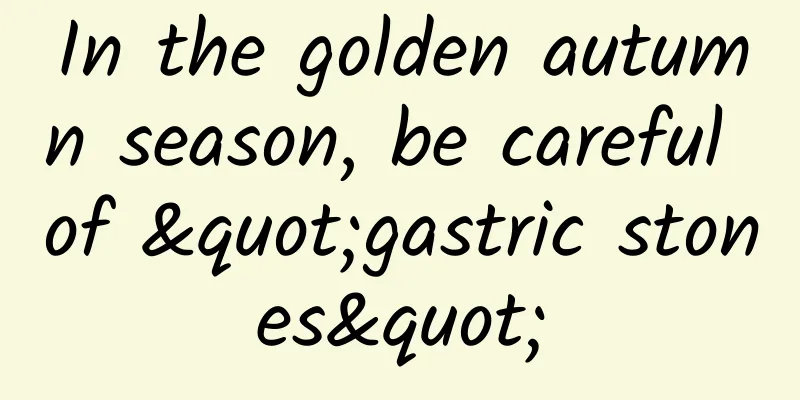In the golden autumn season, be careful of "gastric stones"

|
Autumn is the season of harvest, with a wide variety of fruits and vegetables. Our stomachs also enjoy the delicacies of autumn. However, as a gastroenterologist, I have recently received a number of patients with "gastric stones". What is gastrolithiasis? We may all be familiar with gallstones, kidney stones, and even dental stones. We have heard relatively less about gastric stones. As the name suggests, it is the growth of stones in the stomach. It is generally caused by some foods containing tannic acid (such as persimmons, black dates, hawthorn, etc.) which combine with protein under the action of gastric acid to form water-insoluble tannic acid proteins. These proteins are mixed with cellulose, gum, pectin, etc. to form lumps that keep rolling, which is the formation of so-called gastric stones. What are the dangers and symptoms of gastric stone disease? The stones formed in the stomach remain in the gastric cavity, which can cause discomfort such as indigestion and abdominal distension. The gastric stones repeatedly roll and rub the gastric mucosa, causing gastric mucosal damage and even ulcer formation, leading to abdominal pain, acid reflux, black stools and other symptoms. If the stones are large, they may cause gastrointestinal obstruction, with symptoms such as nausea, vomiting, hematemesis, and difficulty in defecation and flatulence. How to determine whether you have gastrolithiasis? If the patient has a history of eating persimmons, black dates, hawthorns and other foods recently, and has abdominal pain, bloating, indigestion, black stools and other symptoms after eating, then you should be alert to the possibility of gastric stones. After seeing a doctor, an X-ray barium meal or gastroscopy is the main means of diagnosis. What should I do if I have stomach stones? In the early stages of gastric stone disease, when the stone clumps are relatively soft, they can be treated with digestive aids, alkaline foods, and medications (such as baking soda tablets and carbonated drinks). If the results are not good or the gastric stones have been present for a long time, endoscopic lithotripsy can be performed. The gastric stones can be reduced in size with the aid of a lithotripsy basket or a stone removal basket to help them be excreted from the body. If the gastric stones are huge and difficult to handle under endoscopy, surgical removal may be required. How to prevent stomach stones? 1. Avoid eating foods rich in tannic acid such as persimmons (especially unripe persimmons), hawthorns, and black dates on an empty stomach; 2. Avoid eating too much of the above foods at one time; 3. Avoid eating the above foods together with high-protein foods; 4. If you experience stomach discomfort after eating, seek medical attention immediately. 5. People with weak spleen and stomach, the elderly and young children should try to avoid eating the above foods. |
>>: Does frequent anger during pregnancy have any effect on the fetus?
Recommend
How many types of tread patterns are there on car tires? What are the requirements for tire patterns?
Tires are the most important parts of a car body ...
What are the signs before a girl's period?
Women will have signs before their menstruation, ...
What is the cause of slight abdominal pain in early pregnancy?
In the earliest stage of pregnancy, there will us...
What can a hysteroscopy reveal?
As an important method for examining gynecologica...
Talking about children's fever, some issues that parents are concerned about
Author: Liu Quanhua Xinhua Hospital Affiliated to...
How to deal with contact vaginal bleeding
Vaginal bleeding in women is generally caused by ...
What to do if you suffer from insomnia during late pregnancy
Sleep of pregnant women is very important for the...
Is abortion for ectopic pregnancy dangerous?
The symptoms of ectopic pregnancy in the early st...
Stay away from digestive tract infectious diseases, you need to know this secret
"We pay a lot of attention to food hygiene, ...
Women's health maintenance recommends drinking 4 kinds of scented tea
Spring is the best season for health care. In the...
Progesterone nmol at 5 weeks of pregnancy
Generally speaking, there is basically no change ...
What happened to my period not coming?
For women, menstruation occurs every month. Menst...
Can I take antipyretics when I have a fever during pregnancy?
It is very common for pregnant women to have a fe...
Will I have toothache when I'm pregnant?
There will be no complications of toothache when ...
6 ways in daily life that harm women's breasts
Body care: Whether men or women, in addition to t...









